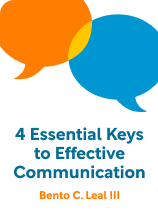

This article is an excerpt from the Shortform book guide to "4 Essential Keys to Effective Communication" by Bento C. Leal III. Shortform has the world's best summaries and analyses of books you should be reading.
Like this article? Sign up for a free trial here.
Do you have trouble expressing your feelings in words? Why is it hard to say what’s really on your mind?
There are many reasons why we might have difficulty using words to express our feelings. We might feel embarrassed, angry, or don’t want to upset another person.
Discover how to express your feelings in words using strategies from Bento C. Leal’s book 4 Effective Keys to Effective Communication.
1. View Yourself as Worthy and Unique
Leal argues that you first must view yourself as worthy to learn how to express your feelings in words—you must believe that you’re a unique person who has something important to add to the world. To cultivate self-worthiness, Leal recommends engaging in practices that help you recognize your passions, talents, and abilities—the things that make you worthy and unique. For example, watch a movie that ignites your passion, create a list of your accomplishments and goals, or write down all of your unique characteristics.
(Shortform note: Psychologists reiterate that how you view yourself and your own worth impacts your relationships and communication with others. If you have low self-esteem and believe that your opinions and feelings aren’t important (that you’re not worthy or unique), you’re likely to develop toxic communication habits like hiding your thoughts or failing to provide others with support. They add that the underlying reason for poor self-image is often abuse or trauma from childhood. In this situation, the best way to build your self-esteem and improve your relationships is to attend therapy.)
2. View Others as Worthy and Unique
According to Leal, once you’ve developed self-worth, turn your perspective outward and look for uniqueness and worth in others. In other words, view them with empathy. To do this, consider the positives of each person you encounter and your relationship with them—what are their skills, talents, positive traits, and so on? What can you learn from them?
Sometimes, it can be hard to think of positives over negatives when we’re speaking with someone we don’t like or are uninterested in. In these situations, Leal recommends taking a moment to fix your perspective: Quell negative thoughts, consider all the positive qualities of the person, and re-engage with a more positive outlook.
(Shortform note: While Leal recommends focusing on people’s positive traits and ignoring their negative ones to foster empathy, this may not be advisable in all situations. If the other person is exhibiting relationship “red flags” like jealousy, gaslighting, or verbal abuse, ignoring these traits in favor of positive ones can harm your well-being and self-worth. Further, by decreasing your self-worth, these interactions will likely decrease your ability to see worth in others (as explained in the previous section). Experts explain that to maintain your well-being, and consequently your ability to empathize with others, you should directly address the issues with the other person and know when it’s time to end the relationship.)
3. Express Yourself Clearly and Respectfully
Once you’ve determined what you want to say to the other person, Leal recommends expressing yourself in a way that makes your thoughts, feelings, and needs easy for the other person to understand and respond to.
To do this, explain your points one at a time. Furthermore, focus the conversation on your perspective of the situation by using the “I” pronoun rather than the more critical-sounding “you.” For example, say “I feel…” rather than “you did…”. You’ll avoid making accusations and assumptions that might make the other person uncomfortable and cause them to disengage from the conversation.
Leal argues that the best way to express yourself clearly and respectfully is to follow a set formula (what he calls an “XYZ Statement”). First, explain the issue in question. Then, explain your perception of the issue. Finally, explain how the issue makes you feel. For example, “Yesterday, my boss called out the quality of my work in front of the office, and it made me think they wanted to publicly embarrass me. It made me feel really ashamed and a little angry at them.”
Additional Tips for Respectful Expression
In Nonviolent Communication, Rosenberg also emphasizes the importance of using “I”-centered statements and set formulas to express yourself respectfully. However, he provides a few additional recommendations that might help you form an even stronger I-statement.
First, Rosenberg warns that many people think they’re using I-statements but are still placing blame on external factors rather than taking responsibility for their emotions. For instance, the phrase “I feel angry because you pushed me,” seems like an I-statement, but it still places blame on the other person. Instead, say something like “I feel angry because I don’t like being pushed.”
Second, whereas Leal presents a three-step formula for crafting an I-statement, Rosenberg’s formula is more detailed, including four steps. Further, Rosenberg’s formula involves specifying when and how you need people to address your needs—while Leal recommends clarifying your needs, he doesn’t include these specifics in his formula.
Rosenberg recommends that you:
- Observe: State the observation that you want to address. For example, “Yesterday, you called out the quality of my work in front of the office.”
- Express your feelings: “I’ve been feeling ashamed and a little angry since that happened…”
- Connect feelings to needs: “… because I need to feel respected and valued in the workplace.”
- Make a specific request: “Can we talk about ways for us to discuss my performance while maintaining a respectful environment that meets my needs?”

———End of Preview———
Like what you just read? Read the rest of the world's best book summary and analysis of Bento C. Leal III's "4 Essential Keys to Effective Communication" at Shortform.
Here's what you'll find in our full 4 Essential Keys to Effective Communication summary:
- How to avoid the two most damaging communication faux pas
- How to listen and express yourself with empathy
- Why having empathy for others starts with seeing the worth in yourself






